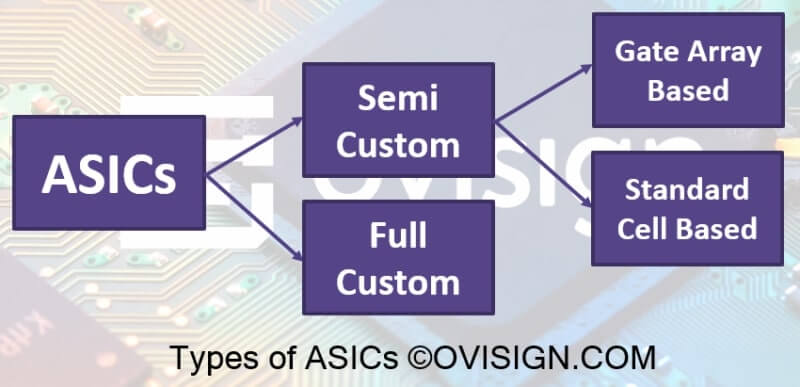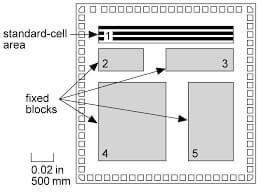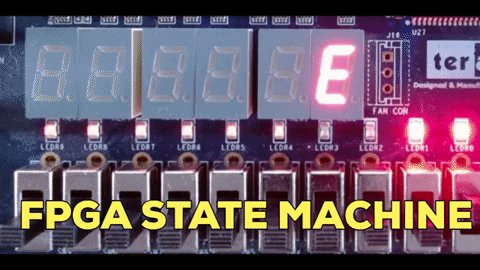ASICs (Application Specific Integrated Circuits) are digital / analog / mixed signal integrated circuits designed based on the requirement of a particular application (a chip to interface a processor and an Ethernet link, a chip used for WIFI, a chip used to access the 5G network, etc…). These types of products are preferred only when large production scale is involved because the production costs being in the million dollar range and involving a large number of financial, logistical and engineering resources (most of the time split around the globe in multiple companies).
Digital ASICs are designed starting from a set of requirements and are implemented following the Modern Digital Design Flow (watch short video). Each ASIC has requirements that characterize all seven Abstraction Levels: System, Algorithm, Register Transfer Level, Gate, Circuit, and Material (watch short video).

Types of ASICs
The fixed-structure ASIC types are the following:
- Full Custom
- Semi Custom (Gate Array Based or Standard Cell based)
1. Full custom design ASICs
 This type of ASIC design is tailored for a specific application so the designers have to engineer all the logic cells down to transistor level for this circuit. All the chips masks are fully customized and the structure of the chip remains fixed. These kind of ASICs are used for maximum performance, minimized area and high degree of flexibility. The design process includes both Analog and Digital engineering and the design flow is risky, lengthy and extremely expensive.
This type of ASIC design is tailored for a specific application so the designers have to engineer all the logic cells down to transistor level for this circuit. All the chips masks are fully customized and the structure of the chip remains fixed. These kind of ASICs are used for maximum performance, minimized area and high degree of flexibility. The design process includes both Analog and Digital engineering and the design flow is risky, lengthy and extremely expensive.
A good example for a Full Custom ASIC is your laptop or desktop CPU (central Processing Unit) which was engineered to transistor level following multiple methodologies, technological flows, simulations tools a vast amount of human, know-how and physical resources (Modern Intel CPU).
2.1 Semi Custom – Gate Array Based
Gate Arrays offer the lowest level of customization because these ASICs use predefined transistors on a silicon wafer. The designer can change the interconnect between transistors by using the metal layers of the die. By opening certain switches you get the desired functionality but the overall possibilities are very limited. You can find out more about Gate Array ASICs here.
2.2 Semi Custom – Standard Cell Based
 For this type of ASICs some of the logic cells (XOR, AND gates, multiplexers …) are predesigned using different configurations and stored inside a library also known as a standard cell library. There cells are grouped into rows of cells which can be connected to obtain the desired functionality. Besides these flexible blocks there are larger blocks like microprocessors or microcontrollers which can be inferred. These large functional blocks are also called Mega cells, Mega functions, System Level Macros, Full Custom Blocks or Fixed Blocks. This type of design has some advantages over Full Custom design like cost efficiency, faster time to market and less risk. The main disadvantage of this flow is the effort involved in designing a Standard Cell library.
For this type of ASICs some of the logic cells (XOR, AND gates, multiplexers …) are predesigned using different configurations and stored inside a library also known as a standard cell library. There cells are grouped into rows of cells which can be connected to obtain the desired functionality. Besides these flexible blocks there are larger blocks like microprocessors or microcontrollers which can be inferred. These large functional blocks are also called Mega cells, Mega functions, System Level Macros, Full Custom Blocks or Fixed Blocks. This type of design has some advantages over Full Custom design like cost efficiency, faster time to market and less risk. The main disadvantage of this flow is the effort involved in designing a Standard Cell library.
ASIC usage
The ASICs revolutionized the way electronics are manufactured and they are used in applications where a chip with the same functionality can be used for a long period of time. You smartphone or Ethernet adapter can remain the same for years and provide the same functionality without being outdated. All the electronics around us contain ASICs and there is virtually no limit for the applications of these types of circuits.


0 Comments